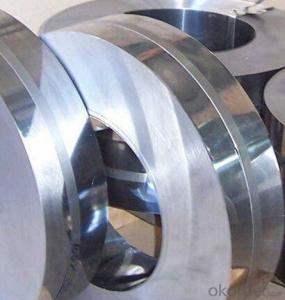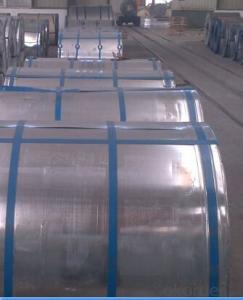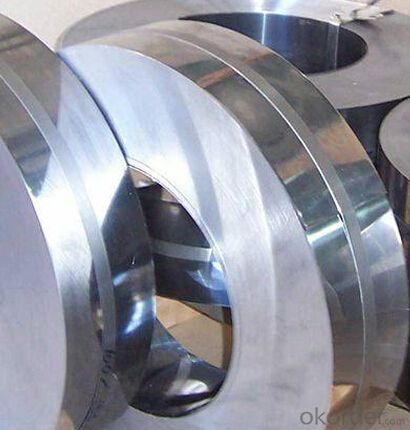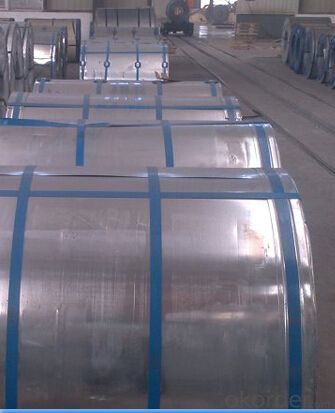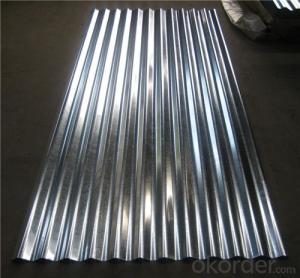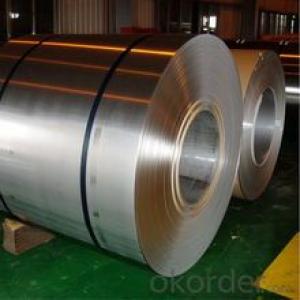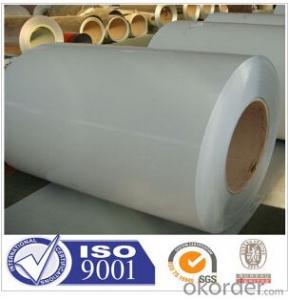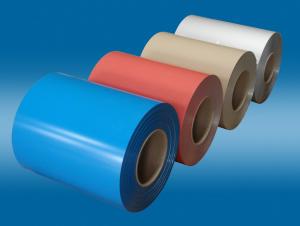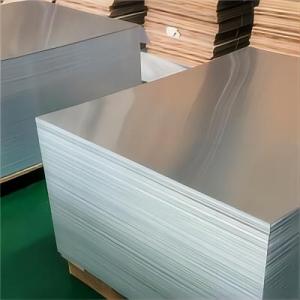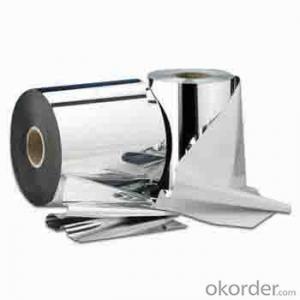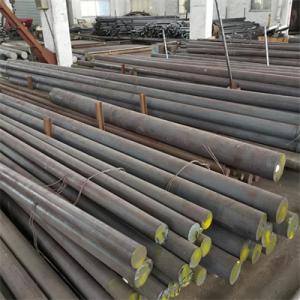Steel Coils in UAE - Cold Rolled Steel Coil for Building Material
- Loading Port:
- Shanghai
- Payment Terms:
- TT or LC
- Min Order Qty:
- 25 m.t.
- Supply Capability:
- 50000 m.t./month
OKorder Service Pledge
OKorder Financial Service
You Might Also Like
Cold Rolled Steel Coil description:
| Standard: | AISI,ASTM,DIN,GB,JIS |
| Thickness: | 0.13-30mm |
| Application: | fridge ,air conditioner, washing |
| Model Number: | SGCC, SPCC, DC51D, SGHC |
| Width: | 600-2500mm |
SPCC cold rolled steel coil specification:
| Raw material | SGCC, SPCC, DC51D, SGHC,A653 |
| Certificate | ISO9001.ISO14001.OHSAS18001 |
| Thickness | 0.16mm-0.7mm |
| Width | 1250mm or under |
| Tolerance | thickness+/-0.01mm |
| Surface treatment | galvanized / galvalumized steel sheets |
T Bending (top-coating) T Bending (back-coating) | ≤3T ≤4T |
| Anti-MEK Wiping | ≥100times |
| Zinc coating | 40-180g |
| Type of coating structure | 2/1 or 2/2 coating, or customized |
| Standard | GB/T12754-2006, GB/T9761-1988, GB/T9754-1988, GB/T6739-1996, HG/T3830-2006, HG/T3830-2006, GB/T1732-93, GB/T9286-1998, GB/T1771-1991, GB/T14522-93 |
| Color | customized |
| Application | Building industry , structural use, roofing, commercial use , household appliance, industry facilities, office buildings |
FAQ:
1)Acceptable payment term and way?
T/T,L/C, T/T + L/C, D/P
2)Acceptable price term
FOB CNF CIF DDU CPT
3)Do you accept OA payment terms?
Yes, sure, but it normally depending on the order value
4)Do you have QC team?
Yeah, sure, our QC team is very important, they will keep the qualitycontrol for our products.
5)What is the validity of your quotation?
Normally 7 days.
6)What is your advantage?
24 hour quick response /Customer oriented/ Credit foremost/ Top quality Excellent.
- Q:What is the lifespan of coated steel coils?
- The lifespan of coated steel coils may differ based on various factors, including the coating type and quality, the environmental conditions they face, and the care and maintenance provided. Typically, high-quality coated steel coils can last 25 to 50 years or longer. However, it is important to note that this estimate is not definitive and the actual lifespan may vary. To significantly extend the lifespan of coated steel coils, it is essential to conduct regular inspections, ensure proper installation, and perform timely maintenance. Moreover, exposure to severe weather, corrosive environments, and improper handling can potentially shorten the lifespan. Consulting with manufacturers or industry experts is recommended to determine the most suitable coating and expected lifespan for specific applications.
- Q:I'm doing a commercial for chemistry and I need to know any kind of chemistry dealing with Callaway Big Bertha Irons. I know they are stainless steel but any more info would help out! Thank you! :)
- Stainless steel is a mixture of metals, each metal is included in order to make up for each others weaknesses. Each metal is included due to a property that is benificial in some way, for instance Chromium is included because it makes the stainless steel 'stainless'. In chemistry a mixture of metals, stainless steel, is called an alloy.
- Q:what do you think about producebility of low density steel? for example: can density of 1020 steel (or ony others) be decreased without any loss of other properties.
- 1. A method has been developed for magnetic phase analysis of Fermanal type alloys as-quenched and after aging. 2. The upper limit of alloying to ensure the optimal mechanical properties was determined more precisely for steel 9G28Yu9MVB. For rods aged at 550°C for 16 h the aluminum content should not exceed 9.2% and the carbon content 0.92%. 3. To ensure the optimal mechanical properties of the deformed metal it is necessary to obtain a fine-grained single-phase austenitic structure after quenching. The amount of hardening phase after quenching should not exceed 15–20% (saturation magnetization around 1600 G).
- Q:Would the Ruger Sr22 pistol or the SW MP 15-22 be any good for the steel challenge?
- Steel plates are very difficult for a .22lr
- Q:How are steel coils inspected for paint adhesion?
- Steel coils are inspected for paint adhesion through various methods such as visual examination, tape test, and cross-cut adhesion test. These tests involve visually inspecting the surface for any paint defects, applying adhesive tape to check if the paint adheres properly, and making cross-cuts to assess the adhesion strength.
- Q:What is the average cost of shipping steel coils?
- The average cost of shipping steel coils can vary depending on various factors such as the distance, weight, dimensions, mode of transportation, and any additional services required. To provide an accurate average cost, it would be necessary to consider these specific details.
- Q:Not sure if stainless steel is actually sealable but what's the best way to clean a brushed stainless steel appliance to not get so many finger prints...etc. I have stainless steel wipes that I used on another appliance and they don't work so great.
- Make a paste from Lemon Juice and salt, scrub gently, and then rinse with water. To clean a stainless steel surface, use mild detergent,or baking soda or vinegar diluted in water. Clean, then dry with a soft cloth. Most stainless steel has a grain; if you are using any kind of an abrasive on a stainless surface, always make sure you clean in the direction of the grain. The don'ts are: Don't use bleach. Don't use steel wool unless it is an absolute last resort. Some of the fine particles can lodge in the surface of the stainless and will eventually rust, giving the appearance that the stainless itself is rusting. Don't let the following food items (ketchup, mustard, mayonnaise, lemon juice, vinegar, salt, salad dressings) remain on your stainless surfaces for any length of time. If they sit on the stainless for more than a few minutes, they may bleach it out. You can actually rub out this white area with a very fine Scotchbrite pad. Make sure you are going along the grain lines and not at right angles to them.
- Q:How are steel coils unloaded from a truck?
- Typically, specific equipment and a well-coordinated process are utilized to unload steel coils from a truck. To ensure the safe and efficient removal of the coils, the unloading process consists of multiple steps. First, a forklift or crane is commonly employed to reach into the truck bed and secure the steel coil. The operator of the forklift or crane carefully positions the lifting apparatus underneath the coil, ensuring that it is centered and balanced. Once the steel coil is securely fastened, the forklift or crane gradually raises it out of the truck bed while maintaining stability. The operator must exercise caution and consider factors such as the weight and dimensions of the coil to prevent any accidents or damage. After the steel coil is lifted out of the truck, it is typically placed onto a designated area, such as a flatbed trailer, storage rack, or directly onto the ground. If placed on the ground, wooden blocks or rubber mats are often utilized as protective measures to prevent any damage to the coil or the surface it is placed on. In certain instances, a specialized coil trailer equipped with hydraulic systems may be used to unload the steel coils. This method is particularly beneficial for unloading larger and heavier coils, as it allows for the tilting of the trailer bed and rolling off the coil. In conclusion, unloading steel coils from a truck necessitates skilled operators, appropriate lifting equipment, and adherence to safety protocols. It is crucial to meticulously follow these steps to ensure the safe and efficient unloading of steel coils.
- Q:What are the various surface finishes available for steel coils?
- The various surface finishes available for steel coils include hot-rolled, cold-rolled, galvanized, coated, and polished finishes.
- Q:What are the different coil packaging methods used for steel coils?
- There are several different coil packaging methods used for steel coils. These include wrapping the coils with stretch film or shrink wrap, using steel or wooden strapping to secure the coils, placing the coils inside wooden crates or metal frames, or using specialized coil packaging machines that can automatically wrap and secure the coils. Each method has its advantages and is chosen based on factors such as the size and weight of the coils, transportation requirements, and protection needed during storage or shipping.
1. Manufacturer Overview |
|
|---|---|
| Location | |
| Year Established | |
| Annual Output Value | |
| Main Markets | |
| Company Certifications | |
2. Manufacturer Certificates |
|
|---|---|
| a) Certification Name | |
| Range | |
| Reference | |
| Validity Period | |
3. Manufacturer Capability |
|
|---|---|
| a)Trade Capacity | |
| Nearest Port | |
| Export Percentage | |
| No.of Employees in Trade Department | |
| Language Spoken: | |
| b)Factory Information | |
| Factory Size: | |
| No. of Production Lines | |
| Contract Manufacturing | |
| Product Price Range | |
Send your message to us
Steel Coils in UAE - Cold Rolled Steel Coil for Building Material
- Loading Port:
- Shanghai
- Payment Terms:
- TT or LC
- Min Order Qty:
- 25 m.t.
- Supply Capability:
- 50000 m.t./month
Offcanvas right
OKorder Service Pledge
OKorder Financial Service
Similar products
New products
Hot products
Hot Searches
Related keywords
